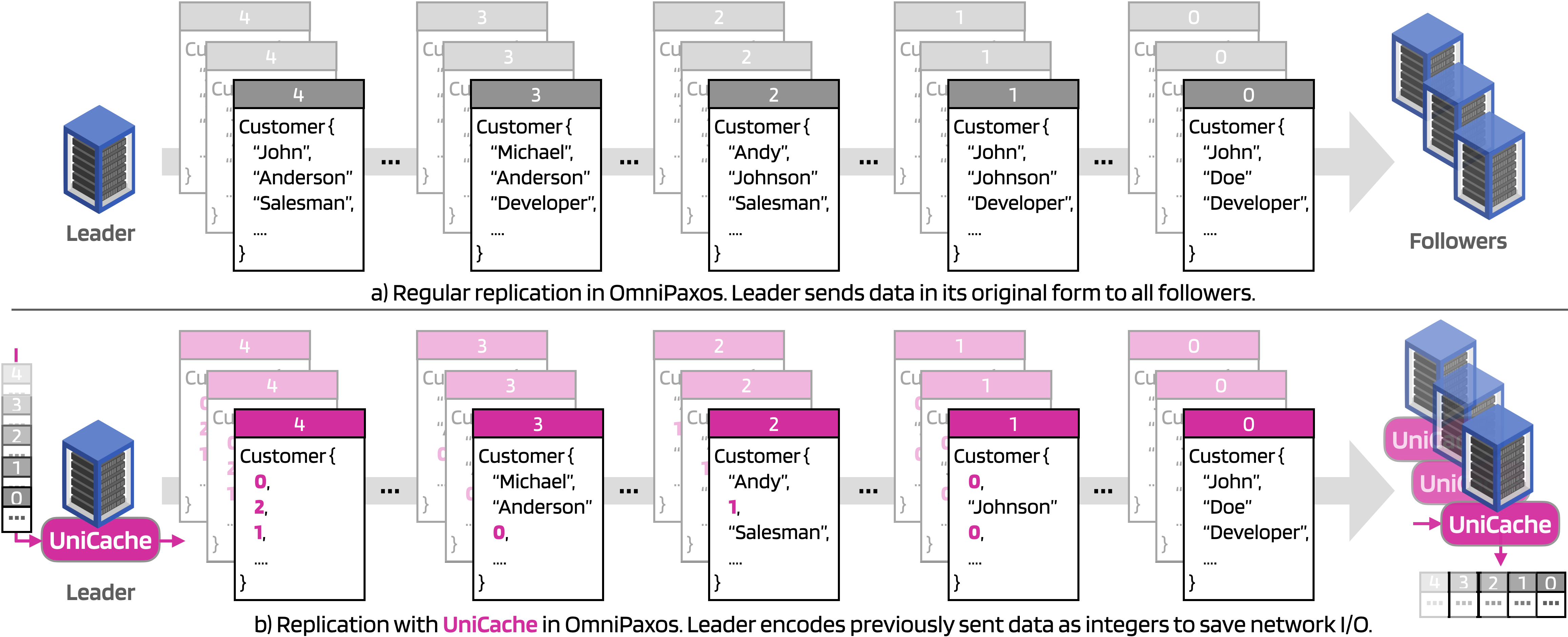UniCache
UniCache is a feature that enables skewed data to be replicated more efficiently in OmniPaxos. This page provides examples and describes how to use it. For more details on the design and benefits of UniCache, check out our paper from EDBT2023.
UniCache is a feature that can reduce the amount of data sent between servers if the data is skewed and certain values reoccur often. UniCache acts as a dictionary that maps popular data to smaller encodings. Users annotate fields in the Entry that are cachable, and when such a value is encountered, it gets transmitted as an encoding instead. In this way, OmniPaxos can reduce the network I/O in skewed workloads by encoding frequently repeated data as smaller types.

Example
As an example, consider an online store that stores its customers in a distributed database replicated by OmniPaxos.
use omnipaxos::macros::Entry;
#[derive(Clone, Debug, Eq, Entry)]
struct Customer {
id: u64,
first_name: String,
last_name: String,
email: String,
profession: String,
}
Each customer has unique id and email, but the first_name, last_name, and profession are fields that may repeat for different customers. For instance, there might be many customers with the first name "John" and the profession "Developer". If the OmniPaxos servers have replicated these values before, it would be unnecessary to resend these values whenever we encounter them again in the future.
Using UniCache
To avoid the redundant replication, we can use the unicache feature and define Customer as follows:
[dependencies]
omnipaxos = { version = "LATEST_VERSION", features = ["unicache"] }
use omnipaxos::macros::UniCacheEntry;
#[derive(Clone, Debug, Eq, UniCacheEntry)]
struct Customer {
id: u64,
#[unicache(encoding(u8))]
first_name: String,
#[unicache(encoding(u16), size(1000))]
last_name: String,
email: String,
#[unicache(encoding(u16), cache(lru))]
profession: String,
}
Note that instead of deriving Entry for the struct Customer, we are now deriving UniCacheEntry. The first_name is annotated with
#[unicache(encoding(u8)] which implies that if there is a cache hit, the value will be sent as a u8 instead of the original type (String). Other attributes are the size and cache. The size lets users define the cache size for the field. The cache lets us set the eviction policy to lfu (least-frequently-used) or lru (least-recently-used).
Note: Users only need to specify which fields are cachable (e.g.,
first_nameandprofession) and not the values of them. UniCache will cache the values of those fields according to the eviction policy.
What’s going on under the hood?
To understand how UniCache works, consider an example where we replicate two customers in OmniPaxos:
let omnipaxos: OmniPaxos = ... // initialise OmniPaxos
let customer0 = Customer {
id: 0,
first_name: "John",
last_name: "Doe",
email: "jd@omnipaxos.com",
profession: "Developer",
};
let customer1 = Customer {
id: 1,
first_name: "John",
last_name: "Johnson",
email: "jj@kth.se",
profession: "Developer",
};
omnipaxos.append(customer0);
omnipaxos.append(customer1);
The first time we perform append with customer0, it gets replicated as usual, but the values of the UniCache fields (i.e., "John", "Doe", "Developer") get cached.
When we replicate the second customer, UniCache will replace any cached values with their index in the cache. In OmniPaxos, customer1 would be sent over the network as the following instead:
/* Encoded version of second_customer in OmniPaxos */
let enc_customer1 = EncodedCustomer {
id: 1,
first_name = 0, // "John" is replaced by an integer (u8)
last_name = "Johnson", // "Johnson" was a cache miss. So it is sent in its original form.
email = "jj@kth.se",
profession = 0, // "Developer" is replaced by an integer (u16)
}
As "John" and "Developer" were in the cache, they get sent over the network as encoded integers (u8 and u16) instead of their original String values. The benefit here is that we send less data over the network by remembering the values we have sent before. So instead of sending "John" as 4 bytes and "Developer" as 9 bytes, we send them as u8 and u16 instead that are one byte and 2 bytes respectively. In this way, we compress these two fields by 1 - (3/13) = 77%.
UniCache guarantees that the encoded values get decoded back to the original values (e.g., "John" and "Developer") before getting stored at the receiving servers. Notice that the enc_customer1 is not visible or stored, it is simply the network representation in OmniPaxos. If we read the log, customer1 will still be in its original form.
let read_second_customer = omnipaxos.read_decided_suffix(1);
match read_second_customer {
LogEntry::Decided(read) => {
assert_eq!(read, customer1);
},
_ => {},
}
Note: The cached values only get encoded in the messages being sent in OmniPaxos. UniCache can therefore only compress the messages but not the storage.